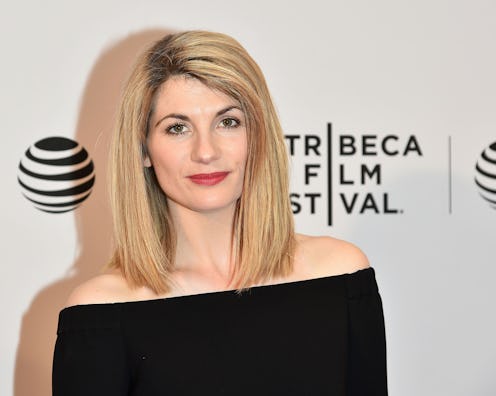Entertainment
Here's Why The First Female 'Doctor Who' Is Everything You Dreamed She Would Be

It's one of the most famous BBC shows ever made, with its characters and references known around the world, and now 55 years after Doctor Who first aired on television, the inimitable Time Lord will finally be played by a woman. In July 2017, the BBC was announced that British actor Jodie Whittaker would play Doctor Who in the franchise's 11th instalment. Travelling through dimensions in a disused police phone box? Fans are just fine with that. But taking over half a century to cast a female lead? Let's just say I'm thrilled the day is finally here where we have a female doctor.
In April 2017, after three seasons as the Doctor, Peter Capaldi announced he was leaving the show, paving the way for rampant speculation about who would take over the Tardis. The Telegraph reported that Rupert Grint, Richard Ayoade, and Paterson Joseph were all in contention, but the producers evidently decided to go in a different direction. While the show has always had memorable female characters like Amy Pond and Clara Oswald, and appearances from brilliant actors like Suranne Jones and Alex Kingston, the fact that women have always played either companions, love interests, or villains has been limiting.
The new season of 10 episodes will air in Autumn 2018 and if that isn't exciting enough, the Express has also reported that Billie Piper will return to make an appearance, so there's plenty to fan-girl about until the season is out.
Originally from West Yorkshire, Whittaker first appeared on screen in the 2006 feature film Venus at just 23 years old. Whittaker was no stranger to acting however, having a seriously impressive background in stage and radio. She trained at Guildhall School of Music and Drama in London, and made her stage debut at Shakespeare's Globe Theatre in a 2005 production of The Storm.
Since then, Whittaker's roles have spanned radio, TV, film, and theatre. She's been nominated for a seriously impressive list of awards, including the British Newcomer Of The Year gong at the 2006 British Independent Film Awards, and Best Actress at the 2017 Evening Standard British Film Awards for her performance in Journeyman. She's also impressive under pressure, with The Independent reporting that she stood in for Carey Mulligan in a 2007 production of The Seagull at the Royal Court with just a few hours notice.
TV viewers may know Whittaker from her roles in Broadchurch, Perrier's Bounty, Good Vibrations, and TV miniseries Trust Me, as well as her appearance in a 2011 episode of Black Mirror. With such an impressive resumé, it's impossible not to be excited by what she will bring to Doctor Who. Previous doctors have all had their idiosyncrasies that made them stand out to fans, so it will be exciting to watch the actor make the role her own when the new season begins.
As a genre, science fiction has been widely criticised, including by writers the Guardian and IndieWire, for being male-dominated and often sexist and problematic. Having substantial female characters with agency in shows like Doctor Who, which so many people grew up watching, is a powerful way to ensure young women go on to achieve everything they're capable of. It's thrilling to think that in Whittaker's Time Lord, young girls will see a strong role model on their TV screens, where older generations perhaps didn't.
Whittaker has always been vocal about being a feminist and in an interview with the BBC after the casting was announced she said, "It feels completely overwhelming, as a feminist, as a woman, as an actor, as a human, as someone who wants to continually push themselves and challenge themselves, and not be boxed in by what you're told you can and can't be". Whittaker also supported the #MeToo movement telling NME in March, "This should be a turning point. This should never happen, not in our workplace [or] in any workplace anywhere."
While there was some criticism online about the hiring of a female doctor — perhaps proving why such a step is so important — news that the Doctor would be played a woman was also met with elated reactions from fans and non-fans alike.
Whittaker will be joined by The Chase presenter and lifelong fan of the show Bradley Walsh, who will play the Doctor's companion. Mandip Gill and Star Wars: The Force Awakens star Tosin Cole round out the cast, making Season 11 possibly the most exciting to date. Whittaker and Walsh seem like a brilliant combination, with videos appearing on Instagram during May's BAFTA awards of the two joking about backstage.
Whittaker was quoted later on the red carpet by Radio Times saying that she "smiles every day” going to work, which can only mean good things for the new season.
With this much energy and positivity surrounding the new episodes, it's pretty impossible not to feel excited about how Whittaker and her co-stars are ushering in a new era for the acclaimed show, bringing it forward into the 21st century in impeccable style. Taking into account the sheer scope of imagination involved with an eccentric show like Doctor Who, it will be fascinating to see what Whittaker will bring to the role, and how the character might change now there's a woman in the hot seat.